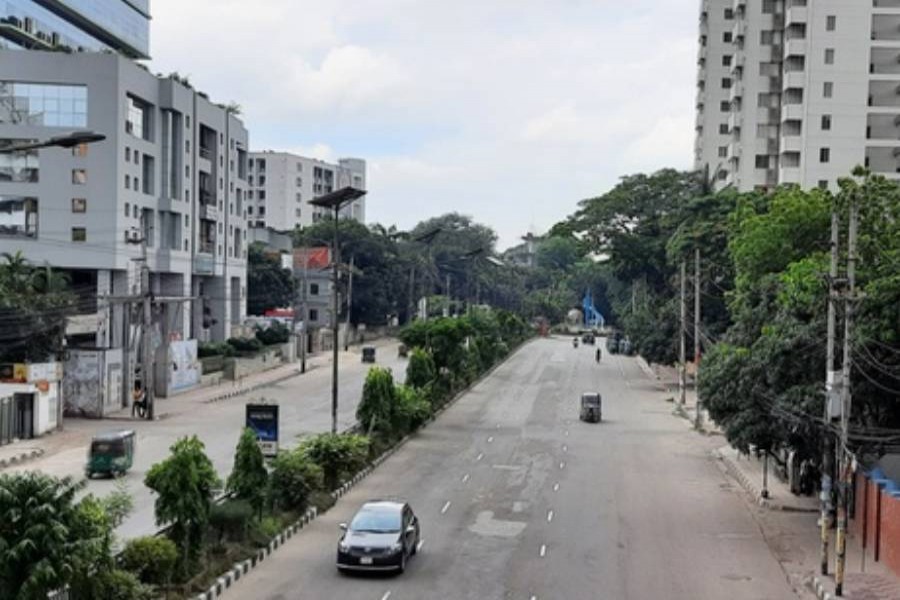The streets of Bangladesh’s capital were largely free of traffic on Monday, the day after Eid, as holidaymakers left the city in droves for their home towns and factories, offices and government buildings stayed closed.
There was almost no traffic in the morning and though public transport was running, there were very few passengers making use of its services. None of the customary congestion could be seen at its traffic signals and intersections. Rickshaws and autorickshaws idled at street corners, waiting for customers. Even the sidewalk was largely empty, reports bdnews24.com.
With the diminished traffic, Dhaka residents were making comfortable trips across the city. Traffic police, usually busy untangling traffic jams, were seen lazing about at traffic boxes.
Roads were clear in Rampura, Shantinagar, Malibagh, Mouchak, Kakrail, Farmgate, Bijoy Sharani, and Naya Paltan.
There were few customers at the wet markets across the city and most of the stalls at the Malibagh Railgate and Shantinagar bazaars were closed. Only a few fruit vendors and local grocers were still plying their trade on the side streets and alleys.
“Dhaka usually clears out after Eid,” says Golam Sarwar, who lives in an apartment in the Bailey Road area and had come to Shantinagar to buy fruit. “Everyone is busy with ritual sacrifices on Eid day. They take a rest the day after. Everyone is relaxing at home today.”
“I came to buy some things for my granddaughter. Otherwise, I wouldn’t have left home.”
Momin, a rickshaw driver, is sitting at the Malibagh intersection, waiting for passengers.
“There are very few passengers the morning after Eid,” he said. “Still, I’m out here in case I can get a few fares. A poor man can’t eat unless he earns an income.”
“But there will be more people out and about in the afternoon. It happened on Eid day too.”
“Dhaka city is a bit different today,” said Rafiqul Islam, who was headed to Banani on an autorickshaw. “I like it – there’s no traffic, no congestion. It doesn’t take forever to get anywhere.”
“I am taking my kids to see my sister in Banani. Transport is easy to find and the rates are reasonable. The autorickshaws aren’t charging too much as there are few passengers.”
“Usually, I charge Tk 250-300 to take passengers from Malibagh to Mohakhali or Gulshan-1,” said Motalleb, an autorickshaw driver. “But today I’ve had to take people for as little as Tk 150.”
In some parts of the capital, people are still sacrificing cows and goats for Eid. But the number is much lower than on Sunday. At the Shantinagar intersection and on Topkhana Road, some of the sacrificed animals were butchered and then skinned. The poor were gathered in the area, hoping for some charity.
“We are waiting to see if they will give us some meat,” Safina Begum said. “Two more sacrifices are being performed in this area. If I’m lucky I’ll get some and be able to cook it up for me and my children.”
Shariful Alam was making a sacrifice on the day after Eid.
“Our family tradition is to sacrifice on Eid and the day after. We are sacrificing a cow today. As usual, we will give most of the meat to the needy.”
NO REST FOR STREET CLEANERS
Piles of waste are stacked up at dumps in the Malibagh, Mouchak, Rampura and other areas of the capital. Street cleaners were working tirelessly, using small push carts to collect waste and move it to these designated areas. Garbage trucks then pick up the waste and take them to the landfills.
“I started work in the afternoon on Eid day,” said cleaner Sofia Begum. “I’m still at work. We don’t get a holiday. I’ll get a day off tomorrow once I manage to finish all of the cleaning work today.”
Cleaners for the city corporation were also hard at work in Kakrail, Farmgate, Karwan Bazar and Banani.
Zulekha Begum, another cleaner, says she has been working since dawn today. Her job is to collect waste from the alleys and bring them out to the intersections for pick-up.
“We dump it here and the trucks pick it up,” she said. “Most of the garbage has been removed from the alleys. Our supervisors are checking the side streets to make sure no waste is left.”


